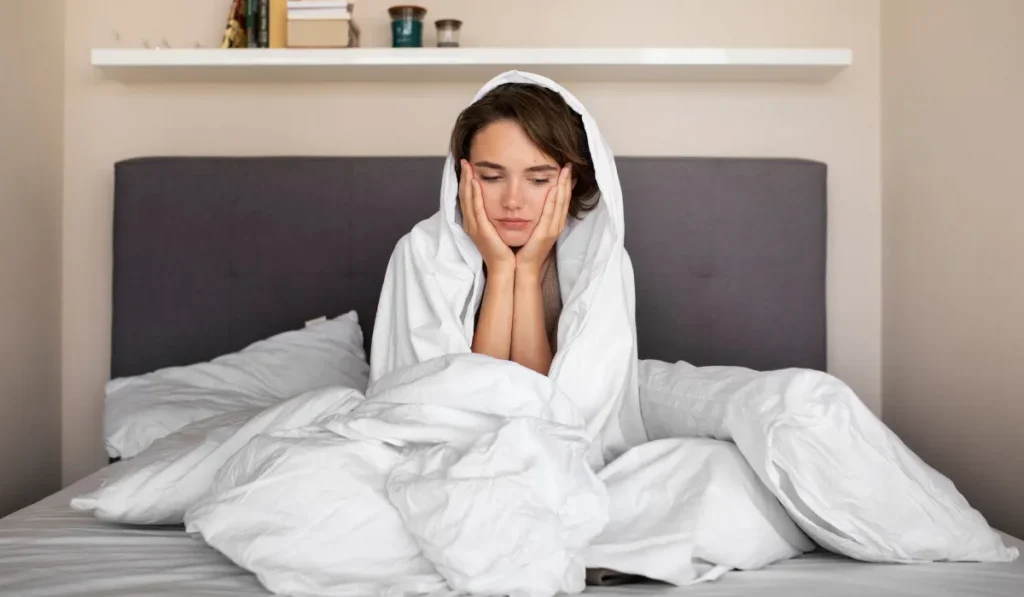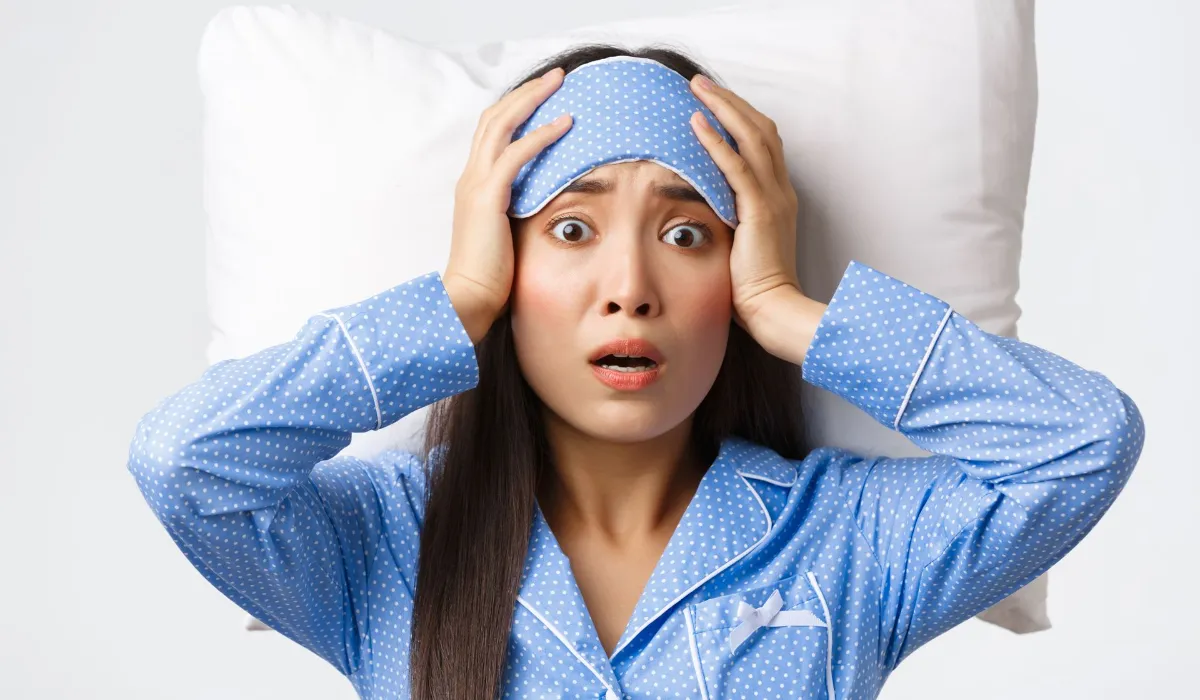Insomnia is a common and complex sleep disorder that affects millions of people worldwide. Whether it hits occasionally or becomes a chronic problem, insomnia disrupts the rest our bodies and minds need to function at their best. This guide covers what is insomnia, how it shows up, what causes it and the best evidence-based solutions available today.
Sleep is not a luxury – it’s a biological necessity. Understanding insomnia is the first step to getting restful nights and better health.
What Is Insomnia?
Insomnia is trouble falling asleep, staying asleep or waking up too early and not being able to get back to sleep. It leads to daytime fatigue, irritability and reduced performance.
Short-Term vs. Chronic Insomnia
- Short-term insomnia (also known as acute insomnia) lasts a few days or weeks and is usually triggered by stress or environmental changes.
- Chronic insomnia occurs at least three times a week and lasts more than three months. It usually requires medical attention and structured treatment.
How Common Is It?
Insomnia is more common than you think. Studies show that around 10–15% of Europeans suffer from chronic insomnia, while up to 30–35% experience short-term sleep disturbances each year.
Why It Matters
Sleep is connected to almost every system in the body. Chronic insomnia increases the risk of:
- Heart disease
- Diabetes
- Workplace and driving accidents
- Mental health issues like depression and anxiety
Types of Insomnia
Insomnia isn’t one size fits all. Knowing the types of insomnia will help you identify patterns and find the right solutions.
1. Sleep-Onset Insomnia:
Trouble falling asleep at the beginning of the night. Often caused by anxiety, stress or poor sleep habits.
2. Sleep-Maintenance Insomnia
Trouble staying asleep through the night. You wake up frequently or lie awake for hours.
3. Early-Morning Awakening Insomnia
Waking up way earlier than you want to and can’t get back to sleep. This type is common in depression.
4. Comorbid or Secondary Insomnia
Occurs with other medical or psychological conditions like chronic pain, depression or sleep apnea.
5. Idiopathic Insomnia
A rare lifelong sleep disorder that starts in childhood and has no cause. Knowing the types of insomnia you’re dealing with is the first step to finding the right treatment.
Insomnia Symptoms
1. Trouble Falling Asleep
This is usually the most obvious symptom, especially for anxious or overstimulated people.
2. Waking Frequently or Too Early
Interrupted sleep or early morning wakefulness disrupts the sleep cycle and reduces restorative sleep phases.
3. Non-Refreshing Sleep and Daytime Effects
Even with enough hours in bed, insomnia sufferers often wake up feeling unrefreshed and experience:
- Fatigue
- Poor concentration
- Mood disturbances
4. Primary vs. Secondary Insomnia
- Primary insomnia
- Secondary insomnia (linked to mental health issues or physical conditions)
What Causes Insomnia?
Knowing the cause is key to the solution.
1. Lifestyle & Environmental Triggers
- Shift work or jet lag
- Noise, light or temperature extremes
- Bad bedtime habits like using screens late at night
2. Mental Health & Stress
- Anxiety, depression, PTSD are common culprits. Stressful life events can also trigger acute insomnia.
3. Medical and Physical Conditions
- Sleep apnea
- GERD
- Chronic pain
- RLS
These conditions can stop you from falling and staying asleep.
4. Medications & Substances
- Caffeine, alcohol, nicotine can delay sleep onset
- Certain antidepressants, blood pressure meds, stimulants can also disrupt sleep
5. Genetics & Demographics
- Age: Sleep quality worsens with age
- Sex: Women are more prone due to hormonal changes
Genetics: Family history increases risk
Diagnosis & Understanding the Problem
1. Clinical Assessment & Sleep Diary
Doctors start with a medical history, symptom discussion and often ask for a 2-week sleep diary to track bedtime, wake time and disruptions.
2. When to Get a Sleep Study
Polysomnography (overnight sleep study) may be recommended if other conditions like sleep apnea, are suspected. These tests monitor brain waves, heart rate, breathing and movements.
3. Identifying Underlying Causes
Thorough evaluation helps to differentiate between psychological, medical and behavioral causes to tailor treatment accordingly.
Evidence-Based Treatment Strategies
1. Sleep Hygiene Essentials
Sleep hygiene means habits that help sleep:
- Keep a consistent sleep schedule, even on weekends
- Limit screen time before bed
- Create a dark, quiet, cool bedroom
- Avoid heavy meals, caffeine and alcohol before bedtime
2. Cognitive Behavioral Therapy for Insomnia (CBT-I)
CBT-I is the gold standard treatment for chronic insomnia. It includes:
- Stimulus control: Associate the bed with sleep only
- Sleep restriction: Limit time in bed to actual sleep duration
- Relaxation techniques: Breathing, meditation, muscle relaxationCBT-I is recommended by major sleep organizations and has long term benefits, not like sleeping pills which only provide short term relief.
3. Medical & Alternative Treatments
- Prescription medications: Like Zolpidem, Temazepam—best for short term use
- Over-the-counter aids: Like melatonin (limited evidence)
- Alternative options: Acupuncture, mindfulness, CBT-I apps, and acupressure have shown promise
4. Lifestyle & Dietary Interventions
- Exercise: Regular aerobic activity improves sleep quality
- Light exposure: Morning sunlight regulates the circadian rhythm
- Diet: A study showed that eating fruits and vegetables (≈5 servings daily) can improve sleep within 24 hours
Preventing Relapse & Sustaining Sleep
1. Stick to Good Sleep Habits
Keep to a stable routine, limit naps and practice stress management regularly.
Track Progress & When to Get Professional HelpIf symptoms persist get a sleep specialist. Apps and sleep trackers can also give you feedback.
2. Don’t Fall Into These Traps
- No screens before bed
- No caffeine in the evening
- Don’t overthink sleep—this creates anxiety and worsens insomnia
Conclusion & Next Steps
What is insomnia? It’s not just a bedtime problem—it’s a serious condition that affects overall health. Lucky for you a holistic approach can help:
- Diagnosis → Find out why
- Treatment → Prioritize CBT-I and sleep hygiene
- Support → Consider alternative and medical options if needed
- Maintenance → Track progress and avoid relapse triggers
If insomnia is getting in the way of your life don’t wait. Start your journey to good nights and better days with Sleepmentor—your go to sleep expert.
Frequently Asked Questions (FAQ)
1: Can insomnia be cured naturally?
Yes. Through CBT-I, consistent sleep hygiene and lifestyle changes like reducing caffeine and improving diet many people get lasting relief without medication.
2: What is CBT-I and is it better than sleeping pills?
CBT-I is a non-drug treatment that addresses the root causes of insomnia. Unlike sleeping pills it gives long term results and is recommended as the first line of treatment by most sleep experts.
3: When do I see a doctor?
If your insomnia lasts more than 4 weeks, causes daytime sleepiness or if you have nighttime breathing issues you should get a professional evaluation. You may need a sleep study.
4: Does diet really matter for sleep?
Yes. One study showed that eating 5 servings of fruits and vegetables a day can improve sleep by 16% in a day.
5: Do alternative treatments like acupuncture work?
Not a replacement for medical treatment but some people get better sleep with acupuncture or acupressure when combined with lifestyle changes and CBT-I.





